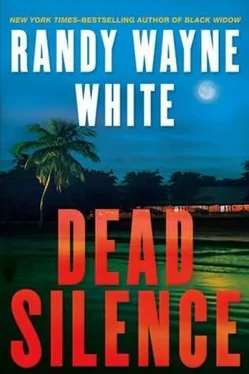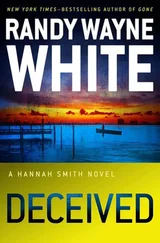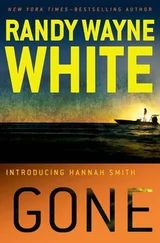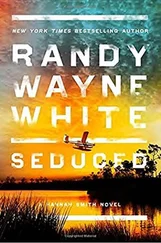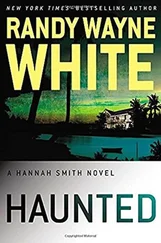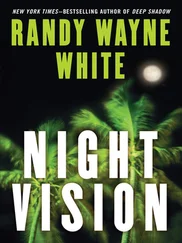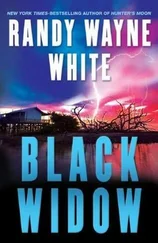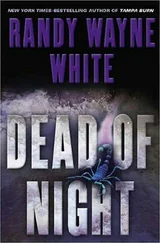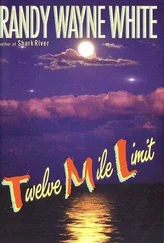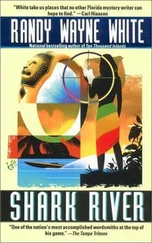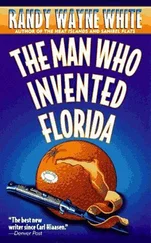Randy White - Dead Silence
Здесь есть возможность читать онлайн «Randy White - Dead Silence» весь текст электронной книги совершенно бесплатно (целиком полную версию без сокращений). В некоторых случаях можно слушать аудио, скачать через торрент в формате fb2 и присутствует краткое содержание. Жанр: Триллер, на английском языке. Описание произведения, (предисловие) а так же отзывы посетителей доступны на портале библиотеки ЛибКат.
- Название:Dead Silence
- Автор:
- Жанр:
- Год:неизвестен
- ISBN:нет данных
- Рейтинг книги:4 / 5. Голосов: 1
-
Избранное:Добавить в избранное
- Отзывы:
-
Ваша оценка:
- 80
- 1
- 2
- 3
- 4
- 5
Dead Silence: краткое содержание, описание и аннотация
Предлагаем к чтению аннотацию, описание, краткое содержание или предисловие (зависит от того, что написал сам автор книги «Dead Silence»). Если вы не нашли необходимую информацию о книге — напишите в комментариях, мы постараемся отыскать её.
Dead Silence — читать онлайн бесплатно полную книгу (весь текст) целиком
Ниже представлен текст книги, разбитый по страницам. Система сохранения места последней прочитанной страницы, позволяет с удобством читать онлайн бесплатно книгу «Dead Silence», без необходимости каждый раз заново искать на чём Вы остановились. Поставьте закладку, и сможете в любой момент перейти на страницу, на которой закончили чтение.
Интервал:
Закладка:
13
Even from a distance, I could see a horse’s bloated body lying in a clearing on the far side of a fence.
White fence, gray horse. Conspicuous on a landscape of hills and winter oaks. At dusk, in January, rural Long Island was as colorless as a woodcut on parchment.
The horse had been shot, maybe while jumping the fence, maybe as he touched down. It was possible that Will Chaser had been aboard.
The animal lay in waist-high sedge, his body mass creating an indentation in the grass. Tail and mane were darker than the Appaloosa spots on his rump. He had been dead for at least eight hours, but vapor continued condensing on his coat as heat dissipated from his body.
We had crossed a hundred yards of pasture. Behind us was one of Long Island’s elite equestrian estates, Shelter Point: dressage ring, boarding barn, breeding lab, staff quarters, forty acres of white fencing, a castle-sized mansion in the distance, an orange wind sock that told me the horsey set used private jets.
The practice arena was patched with snow. Jump stations were fabricated with a theatrical precision that reminded me of a miniature golf course.
A quarter mile down the road was a farmhouse where Shelter Point’s manager lived. Beside it was a semitrailer converted to haul horses in style. The trailer was hooked to a new Range Rover, which was typical of the area, opulence that was elaborately, unmistakably, aggressively understated. Welcome to the Hamptons, a cluster of villages, beach estates and ranches that, for most property owners, constituted the most expensive hobbies in the Western Hemisphere.
Ahead of us, the fence’s top rail had snapped midcenter. It looked as if someone might have hit it with a sledgehammer, but the horse had busted it as he jumped the fence-or attempted to jump the fence.
The fence was five feet high. Heavy two-by-sixes bolted to posts. Solid and unforgiving-obviously.
The horse had ended up twenty yards beyond the fence, to the right of the break. Looked as if he caught the top rail with a hoof, then struggled a few strides trying to recover before he fell.
But it wasn’t the fall that had killed the horse. The FBI agent who’d met us at an East Hampton jetport had already provided some details. That night, around ten p.m., a 911 call was placed from a stable near the manager’s house, but the phone went dead before the operator heard the caller’s voice. The operator made the required call back and the manager answered-the number had been forwarded to his cell, he told her. He was in town, no one was at the ranch, so maybe he’d sat on his phone wrong.
When the manager got home, though, he called 911 and said he needed police, it was an emergency.
Police discovered that the phone line had been ripped from an outside wall of a barn. Inside was evidence of a fight, and the ranch’s prize hunter-jumper stallion was missing. They’d found the horse’s body only four hours ago.
The evidence was still fresh, but it was a difficult scene to read. That’s why the agent, Jibreel Sudderram, wanted to have another look. The FBI had instructed Sudderram to let us tag along because a powerful senator had insisted.
“I heard the boy was a competent horseman,” Sudderram had said as we drove from the airstrip, his inflection asking if we knew anything else about Will Chase.
I did. During the flight, I’d slept for a while, then made phone calls. I’d spoken with one of the boy’s former teachers and also to Ruth and Otto Guttersen. Most of the information came from Otto, a crippled ex-wrestler who seemed to genuinely care about the kid. As we talked, the smart-assed teen became a person-complex, troubled, gifted, tough, tricky and, most all, different.
All three said that about the boy: “Will is different.”
I told the FBI agent that Chaser was more than just a decent horseman, he’d been a rising star on the Oklahoma junior-rodeo circuit.
“I suppose they take rodeo seriously in that region.”
I said, “Chaser was qualifying for senior competitions before he was thirteen. At a regular school, the equivalent would be a seventh grader playing varsity football starting at quarterback.”
William Chaser had lived on three reservations and in six different homes before he was twelve, I told the agent. “The only consistent thing in his life was working on ranches. A former teacher said the boy’s a better barrel rider and roper than most men.”
“Barrel riding… He was that good, huh?”
I said, “Hopefully, he still is,” and paid close attention to the agent’s shielded reaction. The man had seen or heard something that convinced him the boy was dead or soon would be.
Because the agent noticed, he amended, “That was a slip. We’re not even sure the boy was in the area. But some strange things took place last night… or early this morning, more likely. We’re still putting it together.”
I wasn’t convinced he wasn’t convinced. Using the past tense might have been careless but it wasn’t accidental. And there was a reason we’d seen a pair of helicopters working both shorelines as we landed and why there were police cruisers and unmarked cars on most of the roads.
Long Island’s eastern tip forks like a lobster’s claw. The South Fork is a summer retreat, not a winter destination. From the air, the estates had looked as deserted as the shoreline, miles and miles of beach where for two hundred years whalers hunted.
What surprised me was the wild landscape, acres of wooded hills, swamps, kettle ponds and corn stubble. Before today, when I heard the name Long Island, I pictured Brooklyn slums, not a hundred miles of glaciated seacoast, dunes and archaic farms.
I hoped Will Chaser was still alive and on the loose. There was space here to hide from men who had every reason to kill him. Seeing a roadful of cops might not lure a boy with his background from hiding. He had been arrested twice for dealing grass and was also suspected of growing it. And he’d almost gone to jail for stealing a quarter-million-dollar horse. I had discovered all that and more about William J. Chaser, J for Joseph.
The kid was a survivor. The more I learned, the more I wanted to meet him. Not just to save him-I am a rescuer by nature, or so I’m told-but to find out how the boy had managed to escape, if he had indeed escaped. He was unusual and I wanted to know how… and why.
“It’s because you see yourself in the kid,” Tomlinson had told me on the plane. “Or want to. Not all homeless kids are functioning, independent adults by the time they’re sixteen. You were. Maybe Will is, too. But it’s unfair to hang those kind of expectations on him, man.”
I had chided Tomlinson, accusing him of being in a foul mood because the plane didn’t serve booze. That’s what got him started. Maybe he read my refusal to debate as an admission of guilt. Or disinterest. Whatever the reason, it irritated him and he pressed the issue.
“If Will outsmarts the people who snatched him, it validates you, Doc. If he’s too tough for them to break, it validates your totally unsympathetic view of what makes a man strong. Of what constitutes ballsiness in a real man.”
When I replied, “Are you thirsty or just going through withdrawal?,” his irritation escalated a notch.
“I’m talking about your definition of manhood, not mine. You say you’re interested in the boy because he’s different? Baloney. You have no interest whatsoever in people who are really different: old souls with artistic sensibilities, a telekinetic awareness of other dimensions and previous lives.”
I shouldn’t have smiled, because he interpreted my skepticism as derision.
“Laugh all you want, but you’re too honest to say it’s not true. If the kid really is different, it’s not because he has unusual qualities. It’s because he lacks the common qualities that make people human. That’s what you’re hoping anyway. It fits with your Darwinian, no-emotion, no-excuses, start-thinking, quit-whining view of what constitutes a competent male. Competent: the ultimate compliment when you speak of a man. Did you realize that?”
Читать дальшеИнтервал:
Закладка:
Похожие книги на «Dead Silence»
Представляем Вашему вниманию похожие книги на «Dead Silence» списком для выбора. Мы отобрали схожую по названию и смыслу литературу в надежде предоставить читателям больше вариантов отыскать новые, интересные, ещё непрочитанные произведения.
Обсуждение, отзывы о книге «Dead Silence» и просто собственные мнения читателей. Оставьте ваши комментарии, напишите, что Вы думаете о произведении, его смысле или главных героях. Укажите что конкретно понравилось, а что нет, и почему Вы так считаете.
